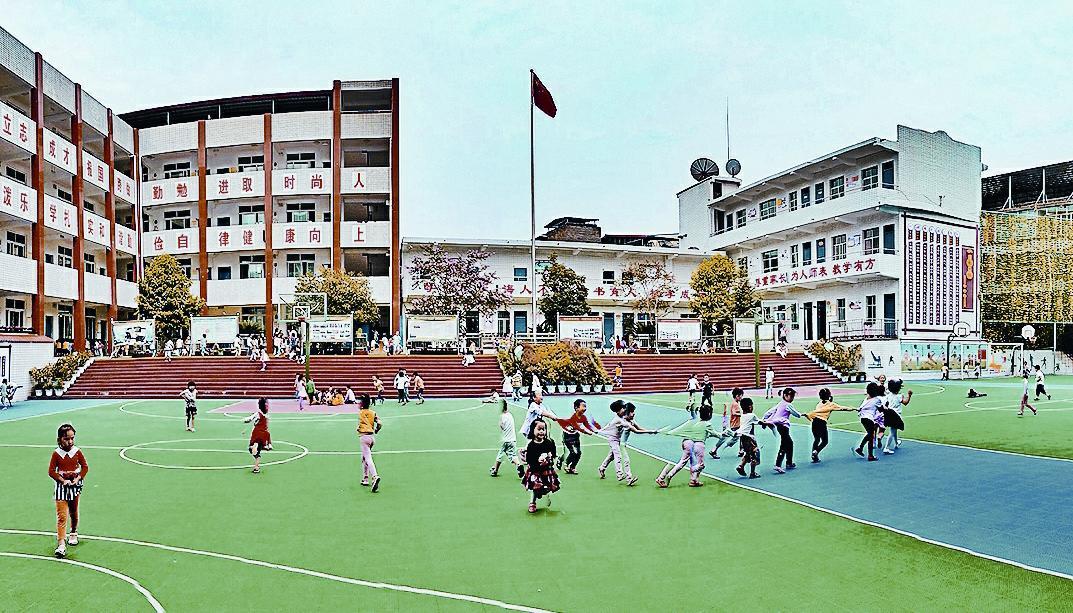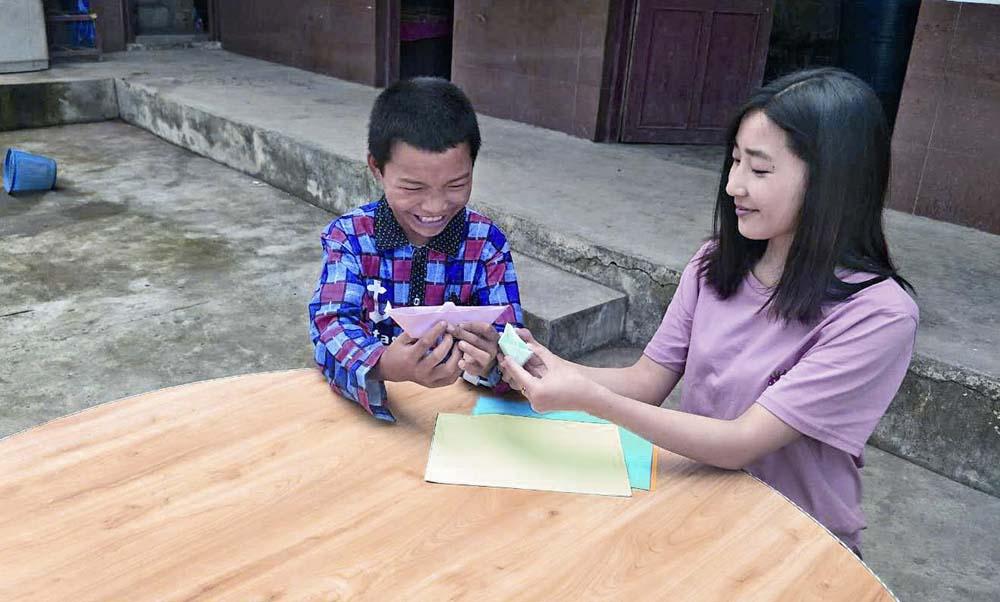Ensuring Education for All
By XU OULU

THE small office, situated in the spacious campus, is pretty obscure. Similarly obscure is the iron cabinet which stands in the corner of the office containing 27 blue file holders.
Each file holder is 3.5 centimeters wide. Put side by side on a table, they stretch across less than one meter in length.
They hold the files of around 1,900 school-age children from 12 villages in Zengkou Primary School of Bazhou District, Bazhong City of Sichuan Province.
Pink labels are glued to the ridges of the folders to indicate the specific contents of each one. They share the same name of “preventing dropouts at Zengkou Primary School.” Besides this, each has its own name, including “a letter to parents,” “investigation of students homes,”etc.
The files were created in 2017. With the implementation of the strategy of targeted poverty alleviation, in order to further ensure that no one is left out in the compulsory education period, China has carried out a package of precise measures to track dropouts during the compulsory education period in recent years. Compared with previous research, the survey is more accurate and the information more detailed.
“Name any household, and we will find out immediately which school their children are going to,” said Feng Delu, the vice principal holding the file binder.
In the primary schools file, every school-age child in the district has his or her own line. A piece of A4 paper is divided into 20 columns to record the basic information of the child: their current school, their guardians names and phone numbers, etc.
Everyone Is Filed
“Impossible” was the word that first popped up when Li Xiao was first informed of the requirements of the survey of all students in the district.
As a teacher at Zengkou Primary School, she was experienced. In the past, when they were doing similar surveys, they were not that particular about the accuracy of the information. But now, the work is more demanding, “Not a single error is tolerated.” They spared no effort to make sure the information is accurate and up to date.
In August and February, Li Xiao has to take out time for two weeks before school starts. She is responsible for the village of Chunshu in the town of Zengkou. She needs to work with colleagues and local officials to publicize the education law and find out the educational status of all village members aged between 0 and 22.
Mou Liang, a mentally handicapped student from Dashu Village, Wulong Town, Cangxi County in Sichuan Province, learned to write his own name and his parents names, to recite Tang poems, and to count from one to 10 in English with the help of teachers who visited his home to teach him. In the words of his mother Li Guozhen, “He couldnt speak before, but now he speaks quite well.”
Zhang Yuqi from Zhaizi Village who attended a primary school in another province received an education subsidy of RMB 500 from her hometown in 2018. That year Cangxi Countys financial department allocated RMB 2 million in subsidies for students studying outside the county who did not enjoy the subsidy as those who attend local schools, benefiting 3,583 students.
“Now, we can guarantee support for every student with a poor student card,”said Zhang Xingbin, deputy director of Cangxi Countys education and science and technology bureau.
We Are More Confident
“Technically, the survey is not particularly difficult; the hard part is how to carry it out well,” said Zhou Yonghong, director of the poverty alleviation and development bureau of Bazhou District.
Shortly after the teachers visit, He Haijiang, deputy town chief of Zengkou, began to inspect each village. He needed to randomly find 20 percent of the villagers who had been surveyed, asking them,“Did the teachers and village officials come to you? What are their questions?”
The investigation work of Li Xiao and her colleagues is included in their schools annual KPI (key performance indictors), and all the files will be shared by the principal, the education bureau, and the poverty alleviation bureau, subject to repeated verification and spot checks three to four times a year.
In order to prevent students from dropping out of school, a responsibility system is established, applying to the head of Bazhou District, director of the education bureau, township heads, village heads, principals, and parents. Everyone shoulders their specific responsibility to prevent dropouts.
“We were not used to it at first. It has never been so rigorous,” a local poverty alleviation official told the reporter.
Some officials were criticized at conferences for failing to fill in the data of a dropout prevention plan. Others have been disciplined for failing to properly keep records of their assistance to poor families.
But with a new understanding of this work, no one muddles along.
Now, during any inspection tour, the officials need to ask any school-age child who does not go to school they encounter the reason for leaving. When they encounter children at home on a sick leave, officials will immediately call the principal to verify it.
In fact, the files play a far more important function than just as an education file.
“Whether the poor have adequate food and clothing, medical care, education, and safe housing are all recorded in the files. One page for one family, and one file for one village,” Zhou Yonghong said.
For poor migrant workers, Zhou Yonghong can accurately tell which province and factory they are working in, what kind of work they are doing, how much their salary is, who is working with them and whether they have received training or not.
“The fight against poverty has forced improvements in our work style and methods,” Zhou said.
“In the past, many rural officials went out to the field without studying specific issues,” Zhang Pingyang, Party secretary of Bazhou District in Bazhong City, said,“Now, they work more meticulously.”
In Zhou Yonghongs eyes, not only education, but also the whole anti-poverty campaign has benefited from the establishment and consolidation of the responsibility system. He said, “Now all our work is carried out in the documentation of files. Were confident in answering all related questions.”
“We are in the process of institutionalizing, and studying how the results of poverty alleviation efforts can be applied to rural revitalization,” Zhang Pingyang told the reporter.
Xie Changqing from Nanyang Primary School scored high in the high school entrance examination. Not surprisingly, in a few months, her information in the file will get updated. Shes looking forward to going to a college not far from home in order to save on transit fares. But when she grows up, she hopes to take her parents to “far away places” to see the outside world.

